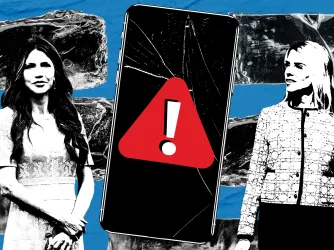Table of Contents
Hartford Police Department says it will arrest people for making alleged threats — even when it knows they weren’t true threats

Johnathon Henninger via Shutterstock.com
Police cars block a roadway in Hartford, Connecticut
The First Amendment doesn’t protect true threats, but it does protect jokes, hyperbole, and other statements that don’t seriously communicate an intent to commit violence. FIRE explained as much to the Hartford Police Department last week after one of its officers said the department would arrest anyone who used language that could be perceived as threatening, regardless of intent or context.
On Feb. 5, Hartford Police arrested University of Hartford student Tenuun Enkhbat for making allegedly threatening posts on the social media app Yik Yak, including, “We bouta have a shootout,” and, “I got glocks on deck!” Enkhbat was charged with threatening in the first degree. Police did not find any weapons on campus, and Enkhbat told them he made the posts as a joke, imitating how he had heard other students talk.
After the arrest, Hartford Police Sgt. Chris Mastroianni made the following statement:
So the message here is we were able to vet these threats pretty quickly and kinda come to the conclusion that they weren’t imminent. And there was some joking nature involved. However, we’re going to treat them all the same. It’s not going to be tolerated and I think the school would say the same thing is there’s zero tolerance for any language like that.
Mastroianni said it does not matter “whether you think you’re joking around or not; if there’s certain language, certain dialogue, that occurs, we’re going to take it seriously and we’re going to arrest you for that.”
Whether or not Enkhbat’s arrest was justified, Mastroianni’s comments betray a misunderstanding of what the First Amendment protects.
The First Amendment has zero tolerance for criminal prosecution of speakers for jokes, satire, or heated political rhetoric.
True threats are one of the few narrow categories of unprotected speech. As the Supreme Court has explained, a “true threat” is a statement through which “the speaker means to communicate a serious expression of an intent to commit an act of unlawful violence to a particular individual or group of individuals.” That includes intimidation, which is speech that “directs a threat to a person or group of persons with the intent of placing the victim in fear of bodily harm or death.” As we’ve recently argued to the Supreme Court, this definition requires that the speaker specifically intended to cause fear.
True threats do not include jokes or hyperbolic statements that refer to violence.
In 1966, an 18-year-old black man named Robert Watts attended an anti-war rally at the Washington Monument. During a small discussion group about police brutality, Watts allegedly said:
They always holler at us to get an education. And now I have already received my draft classification as 1-A and I have got to report for my physical this Monday coming. I am not going. If they ever make me carry a rifle the first man I want to get in my sights is L. B. J. . . . They are not going to make me kill my black brothers.
Watts was arrested and convicted of violating a federal law that made it a crime to threaten the president. The Supreme Court threw out the conviction, holding Watts’ statement was mere “political hyperbole” protected by the First Amendment.
As FIRE’s letter to the Hartford Police Department and the Hartford State’s Attorney explains, contrary to Mastroianni’s statement, the government may not arrest or prosecute individuals for “certain language” or “dialogue” without considering the intent of the speaker and the context in which the statement occurred. The exaggerated or “joking nature” of a statement is, in fact, highly relevant to whether First Amendment protection applies.

Silencing the boo birds: University of Hartford improperly threatened student-athletes over ‘disruptive’ graduation expression
Certainly, the police should investigate and take seriously reports of alleged threats. But if an investigation reveals that no true threat was made, it should proceed no further.
The absurdity of ignoring the context of purportedly threatening statements was also on full display last fall when University of Utah police arrested student Meredith Miller for a Yik Yak post joking that she would detonate the school’s nuclear reactor if the Utes lost their upcoming football game. It’s safe to say nobody ran for a bomb shelter after seeing Miller’s post. Yet, foreshadowing Mastroianni’s comments, the university police chief said the school has a “zero-tolerance policy for these kinds of threats.”
The First Amendment has zero tolerance for criminal prosecution of speakers for jokes, satire, or heated political rhetoric. FIRE looks forward to confirmation from the Hartford Police Department and Hartford State’s Attorney that they will faithfully apply the First Amendment’s exception for true threats.
Recent Articles
Get the latest free speech news and analysis from FIRE.

FIRE sues Bondi, Noem for censoring Facebook group and app reporting ICE activity

Deep dive into New York’s proposals to ban demonstrations near houses of worship

Iran replaced my mother’s voice with silence


